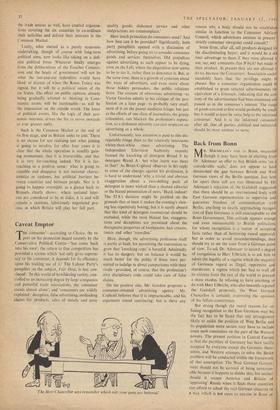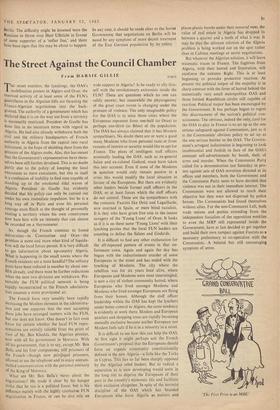Back from Bonn
MR. MACNIILLAN.s visit 10 Bonn, stieeesaui though it may have been in eliciting from Dr. Adenauer an offer to buy British arms 'on j considerable scale,' does not appear to ha“: diminished the gap between British and \\ est German views of the Berlin question. Just how far apart these still are was illustrated by Dr. Adenauer's rejection of the Gaitskell suggestion that there should be an international body )%ith East German representation to supervise and guarantee freedom of communication with Berlin; anything so nearly approaching recogni- tion of East Germany is still unacceptable to thei Bonn Government. This attitude appears strange and even unreasonable to British politicians. for whom recognition is a matter of accepting facts rather than of bestowing moral approval: but in order to avoid misunderstandings, they should try to see the issue from a German point of view. To ask Dr. Adenauer to accord a degree of recognition to Herr Ulbricht is to ask him to admit the legality of a regime which the majority of Germans regard as illegal, oppressive and murderous; a regime which has had to wall off its citizens from the rest of the world to prevent a mass exodus. In refusing to have anything to do with Herr Ulbricht, who also instantly rejected the Gaitskell proposals, the West German Chancellor is certainly expressing the opinions of his fellow-countrymen.
But strong though the moral reasons for re- fusing recognition to the East Germans .may be, the fact has to be faced that any arrangement likely to make the position of West Berlin and its population more secure may have to include some such concession on the part of the Western • powers. The present position in Central Europe is that the partition of Germany has been tacitly accepted by everyone except the Germans them- selves, and Western attempts to solve the Berlin problem will be conducted within the framework of that assumption. The West German Govern- ment should not be. accused of being unreason- able because it happens to dislike this; but neither should it accuse America and Britain of 'appeasing' Russia when it finds those countries can afford to admit the real German situation in a way which is not open to anyone in Bonn or Berlin. The difficulty might be lessened were the Russians to throw over Herr Ulbricht in favour of some supporter of a 'softer line,' and there have been signs that this may be about to happen. In any case, it should be made clear to the Soviet Government that negotiations on Berlin will be eased by any symptom of more decent treatment of the East German population by its rulers.































 Previous page
Previous page